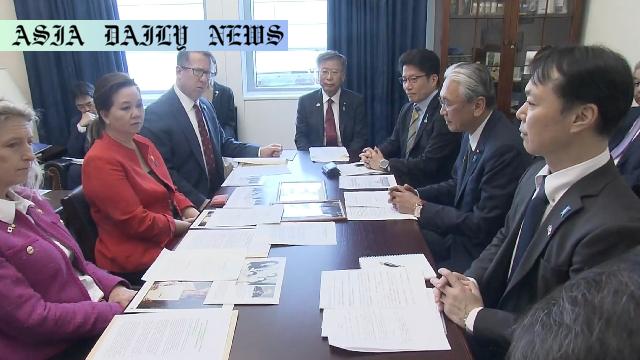Abduction: Japanese families seek U.S. support over 47-year abduction crisis to reunite loved ones with families.
Japanese families seek U.S. political support for abductees.
The 47-year struggle against North Korean abduction continues.
Urgency arises as parents of abductees age and seek reunification.
Meetings conducted with lawmakers and White House officials.

Introduction: An Unresolved Crisis
The anguish of families left behind by North Korea’s abduction of Japanese citizens continues to haunt the international stage. With over four decades having passed, the emotional pleas for reconciliation and justice remain unanswered. Recently, families of the abductees visited the United States, urging policymakers and senior officials to recognize the importance of resolving this prolonged crisis. This effort underscores not only the families’ resilience but also the importance of continued diplomatic pressure on North Korea. It highlights a universal need for compassion, justice, and international solidarity for those affected by state-sponsored abductions.
The Stories Behind the Names
The plight of individuals such as Yokota Megumi, who was abducted at age 13, and Taguchi Yaeko, kidnapped as a young mother, are emblematic of the broader crisis. Their families, including Yokota’s younger brother Takuya and Taguchi’s son Koichiro, have become vocal advocates for awareness and intervention. These heartbreaking stories reflect the irreplaceable years of separation and lost connections. They provide a human face to an issue that has been fraught with political complexities and diplomatic stalemates, showing the enduring strength of family bonds and hope.
The Stance of the United States
In their meetings with U.S. lawmakers such as Representative Jill Tokuda, as well as senior White House representatives, the Japanese families emphasized the geopolitical importance of resolving the abduction issue. They requested the inclusion of this topic in future diplomatic dialogues, especially if there are discussions between the U.S. and North Korea. By putting a human dimension to their appeal, they have managed to secure broader support and understanding. The U.S. has reiterated its commitment by acknowledging that this issue requires enduring international cooperation.
The Elderly Parents’ Plea
A heart-wrenching element of this issue centers on the aging parents of the abductees. They fear that time will run out before they have the chance to reunite with their children. Yokota Takuya made an emotional appeal on behalf of his 89-year-old mother, underscoring the urgency of immediate intervention. It serves as a poignant reminder of the human cost tied to diplomatic delays. Each passing moment dwindles the chances of these families ever seeing their loved ones again, making their calls for help more desperate and impactful.
Turning Support Into Action
While gaining international support is essential, turning this goodwill into actionable diplomatic measures remains a daunting task. Yokota and Iizuka have expressed their determination to leverage their new connections in Washington for tangible results. This effort aligns with the Japanese government’s long-standing stance on the matter. Their collective mission stresses that a resolution is not only necessary for the affected families but also serves as an important step in addressing state violations of human rights. The perseverance of these families serves as a powerful testament to hope and justice.
Conclusion: A Call to Conscience
The 47-year-old struggle of Japanese families facing North Korea’s abduction crisis highlights critical discussions about human rights, justice, and international accountability. While political challenges persist, the voices of these families continue to resonate on the global stage. It is a reminder to the international community of its responsibility to act decisively on behalf of those who cannot fight for themselves. The collective efforts of affected families and supportive governments must converge to deliver healing, closure, and justice for all those involved.



Commentary
Empathy and Solidarity with the Abductees’ Families
It is emotionally gut-wrenching to hear the stories of families who have been separated for nearly half a century. The experiences of individuals like Yokota Megumi and Taguchi Yaeko become more than just news headlines – they reflect profound human suffering exacerbated by international politics. Imagine the unbearable pain of parents growing old with the fading hope of ever reuniting with their children. This is not just a Japanese tragedy; this is a global call for empathy and justice. Their struggle serves as a timeless reminder of the impact of state actions on individual lives and the need for the international community to address such painful legacies.
The Universal Need for Justice
What makes this issue so compelling is its universal appeal. Although the abduction crisis is a specific bilateral matter between Japan and North Korea, the principles it raises—human rights, justice, and family ties—transcend national borders. It is difficult not to admire the determination of these families who, despite decades of heartbreak, continue to fight for reconciliation. Their courage demands solidarity, and it is empowering to see growing international attention fostered through diplomatic outlets such as their visits to Washington.
The Role of Diplomacy and Advocacy
While diplomacy can be slow and convoluted, it is the only viable path for resolving such deeply entrenched issues. The efforts of Yokota and Iizuka in appealing directly to U.S. policymakers reflect how citizen advocacy can shape government priorities. By humanizing a political issue, they compel governments to act not out of obligation but out of moral responsibility. It is now up to the international community to ensure that their courage and persistence do not fade into obscurity. Resolving this crisis would not only reunite families but also reaffirm humanity’s commitment to justice and compassion.